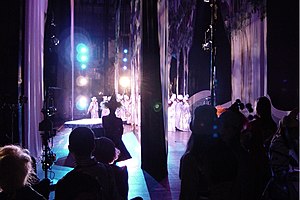Stage fright

Stage fright or performance anxiety is the anxiety, fear, or persistent phobia which may be aroused in an individual by the requirement to perform in front of an audience, whether actually or potentially (for example, when performing before a camera). Performing in front of an unknown audience can cause significantly more anxiety than performing in front of familiar faces. In some cases, the person will suffer no such fright from this, while they might suffer from not knowing who they're performing to. In the context of public speaking, this may precede or accompany participation in any activity involving public self-presentation. In some cases stage fright may be a part of a larger pattern of social phobia (social anxiety disorder), but many people experience stage fright without any wider problems. Quite often, stage fright arises in a mere anticipation of a performance, often a long time ahead. It has numerous manifestations: stuttering, tachycardia, tremor in the hands and legs, sweaty hands, facial nerve tics, dry mouth, and dizziness.
People and situations[]
Stage fright can occur in people of all experiences and backgrounds, from those who are completely new to being in front of an audience to those who have done so for years. It is commonly recognized in the population. Stage fright may, for example, have a negative impact on the individual's performance, such that it affects their confidence during job interviews. It also affects actors, comedians, musicians, and politicians. Many people with no other problems in communication can experience stage fright, but some people with chronic stage fright also have social anxiety or social phobia which are chronic feelings of high anxiety in any social situation. Stage fright can also be seen in school situations, like stand up projects and class speeches.
Effects[]
When someone starts to feel the sensation of being scared or nervous they start to experience anxiety. According to a Harvard Mental Health Letter, "Anxiety usually has physical symptoms that may include a racing heart, a dry mouth, a shaky voice, blushing, trembling, sweating, lightheadedness, and nausea".[1] It triggers the body to activate its sympathetic nervous system. This process takes place when the body releases adrenaline into the blood stream causing a chain of reactions to occur. This bodily response is known as the "fight or flight" syndrome, a naturally occurring process in the body done to protect itself from harm. "The neck muscles contract, bringing the head down and shoulders up, while the back muscles draw the spine into a concave curve. This, in turn, pushes the pelvis forward and pulls the genitals up, slumping the body into a classic fetal position".[2]
In trying to resist this position, the body will begin to shake in places such as the legs and hands. Several other things happen besides this. Muscles in the body contract, causing them to be tense and ready to attack. Second, "blood vessels in the extremities constrict".[2] This can leave a person with the feeling of cold fingers, toes, nose, and ears. Constricted blood vessels also gives the body extra blood flow to the vital organs.
Treatment[]
Propranolol is occasionally used to treat performance anxiety.[3]
Famous people[]
This section needs additional citations for verification. (August 2015) |
Many well-known public performers have had stage fright and were able to overcome their problem, including Al Jolson, Brian Wilson, Virginia O'Brien, Michael Gambon, Lorde, Jason Alexander, Mose Allison, Maya Angelou, David Brenner, Peter Coyote, Olympia Dukakis, Richard Lewis, Barbra Streisand,[4] Adele, David Warner,[5] Niall Horan, Frankie Howerd, Mike Yarwood, Ian Holm,[6] Lady Gaga, Mariah Carey, Peter Gabriel, Donald Fagen, John Lydon, and Amanda Seyfried.[7]
In some cases, famous stars have struggled to cope with their anxiety. Hugh Grant said on starring in the movie Music and Lyrics that he "did the whole film full of lorazepam."[8]
Not every performer suffers from stage fright. Ethel Merman said:[9]
What’s there to worry about? I know my lines. … Why should I be nervous on opening night? The people who paid for tickets for a new play, they’re the ones who should be nervous.
See also[]
- Category: Shyness
- Camera shyness
- Counterphobic attitude
- Glossophobia
- Test anxiety
References[]
Notes
- ^ Beyond Shyness 2003.
- ^ Jump up to: a b Cyphert 2005.
- ^ Davidson, JR (2006). "Pharmacotherapy of social anxiety disorder: what does the evidence tell us?". The Journal of Clinical Psychiatry. 67 Suppl 12: 20–6. doi:10.1016/j.genhosppsych.2005.07.002. PMID 17092192.
- ^ "I Can't Go On!" by Joan Acocella, The New Yorker, 3 August 2015
- ^ 'The Vanishing', interview with David Warner, 'The Guardian', 5 February 2002.
- ^ [1]
- ^ Berry, Mick (2009). Stage fright 40 stars tell you how they beat America's #1 fear. Tucson: See Sharp Press. ISBN 978-1884365461.
- ^ "Hugh Grant scared he will never find love". mirror.co.uk. Daily Mirror. 8 December 2009.
- ^ Caryl Flinn in Brass Diva, the Life and Legends of Ether Merman ISBN 978-0-520-22942-6 pp. 205 & 306
Sources
- "Beyond shyness and stage fright: Social anxiety disorder". Harvard Mental Health Letter. 4 April 2010. Retrieved December 8, 2012.
- Dale, Cyphert (2005). "Managing Stage Fright". Retrieved 10 December 2012.
Further reading[]
- Bryce, Suzanne (15 November 2005). "Beta Blockers as Treatment for Stage Fright". Health Psychology Home Page. Vanderbilt University. Retrieved 10 December 2012.
- Havas, Kató (1973). Stage Fright – Its Causes and Cures in Violin Playing. London: Bosworth & Co. Ltd. ISBN 9781849380751.
- Neftel, Klaus A.; Rolf H. Adler; Louis Kappeli; Mario Rosi; Martin Dolder; Hans E. Käser; Heinz H. Bruggesser; Helmut Vorkauf (November 1982). "Stage Fright in Musicians: A Model Illustrating the Effect of Beta Blockers" (PDF). Psychosomatic Medicine. 44 (5): 461–69. doi:10.1097/00006842-198211000-00008. PMID 6129674. Retrieved 11 December 2012.
- Solovitch, Sara (16 June 2015). Playing Scared: a History and Memoir of Stage Fright. ISBN 978-1620400913.
- Talbott, Frederick (23 July 2014). Defeating Stage Fright: The Path to Speaking Freedom (Kindle eBook). p. 174.
- Anxiety disorders
- Psychiatric diagnosis
- Stagecraft